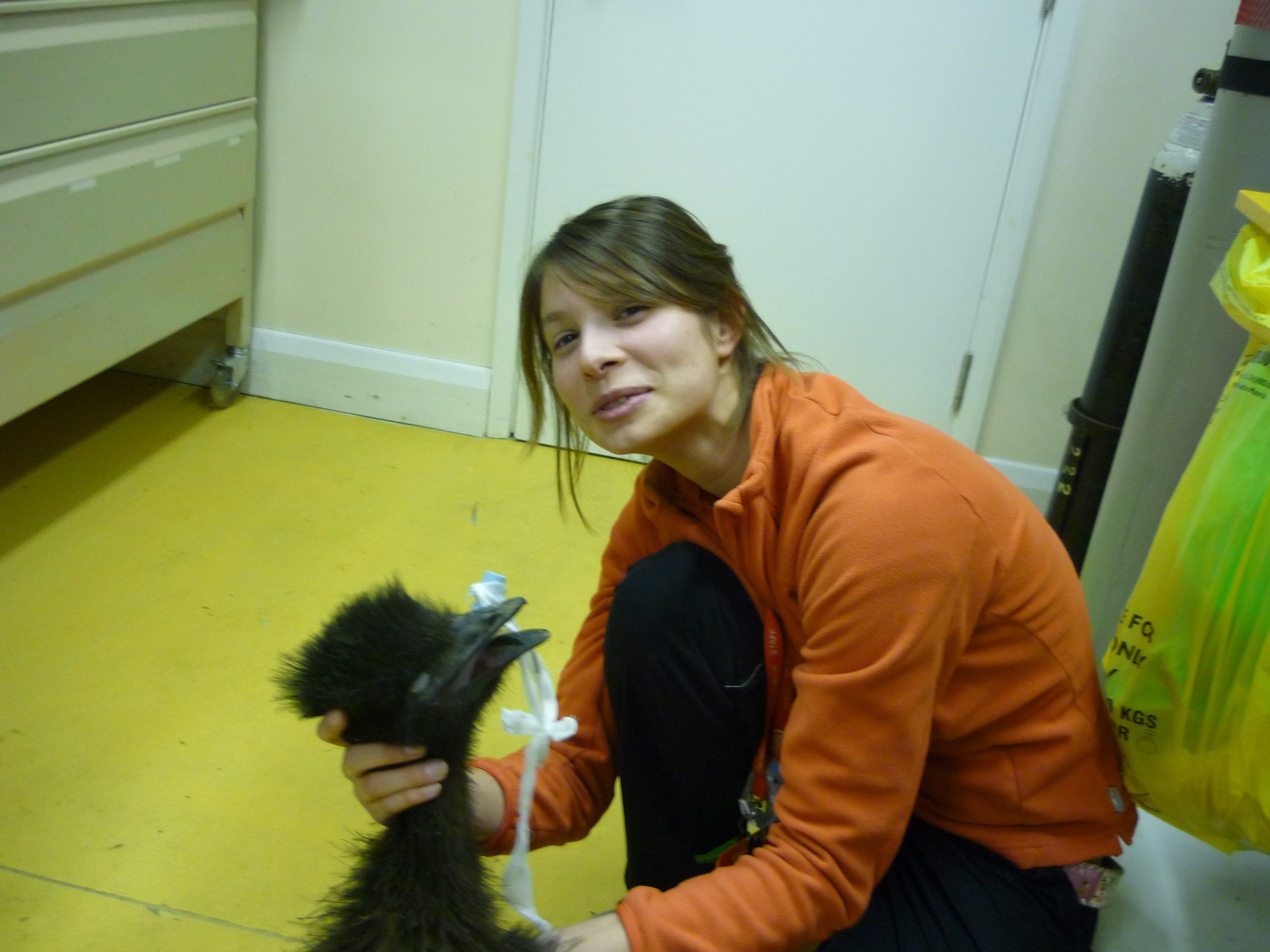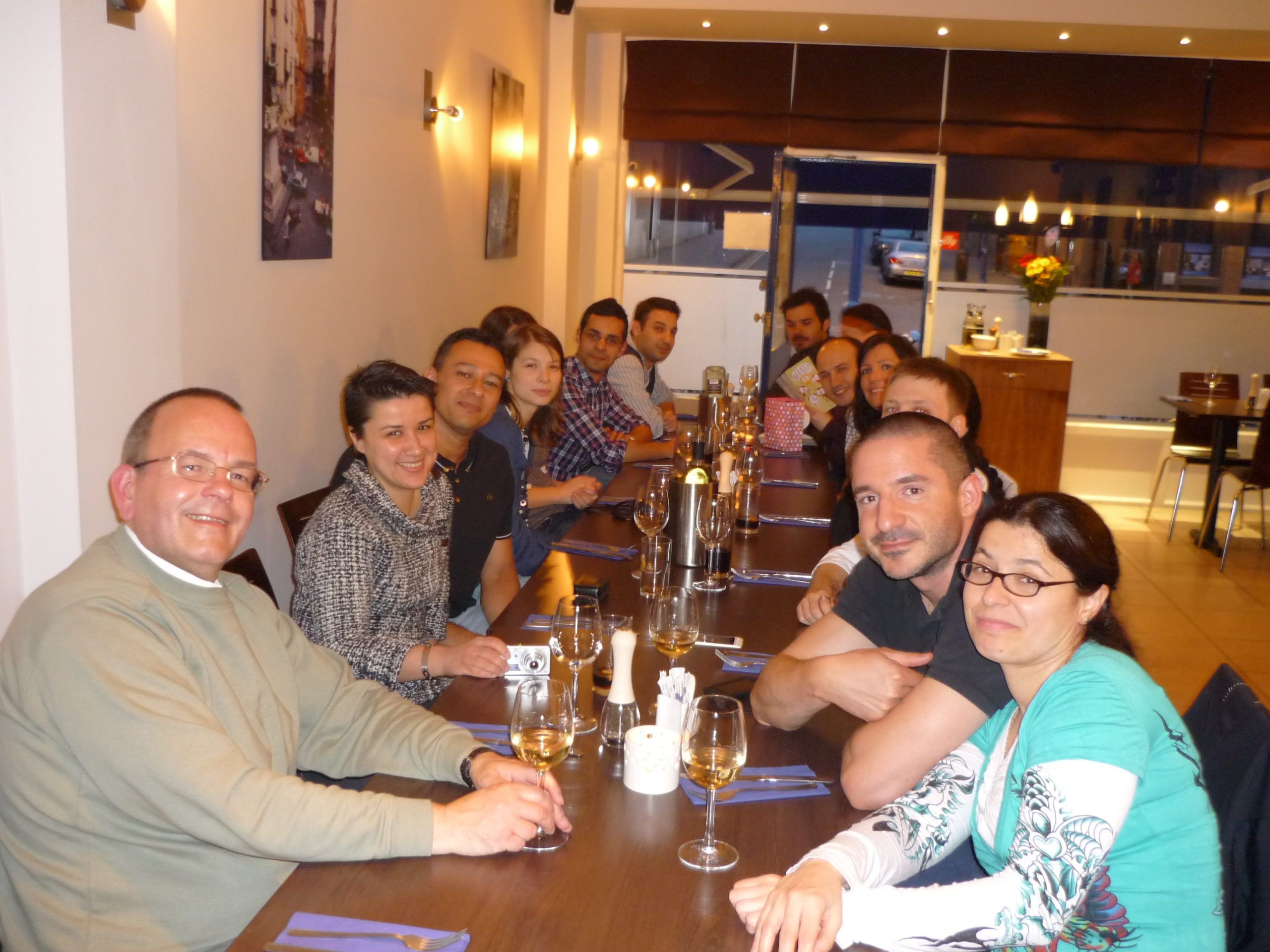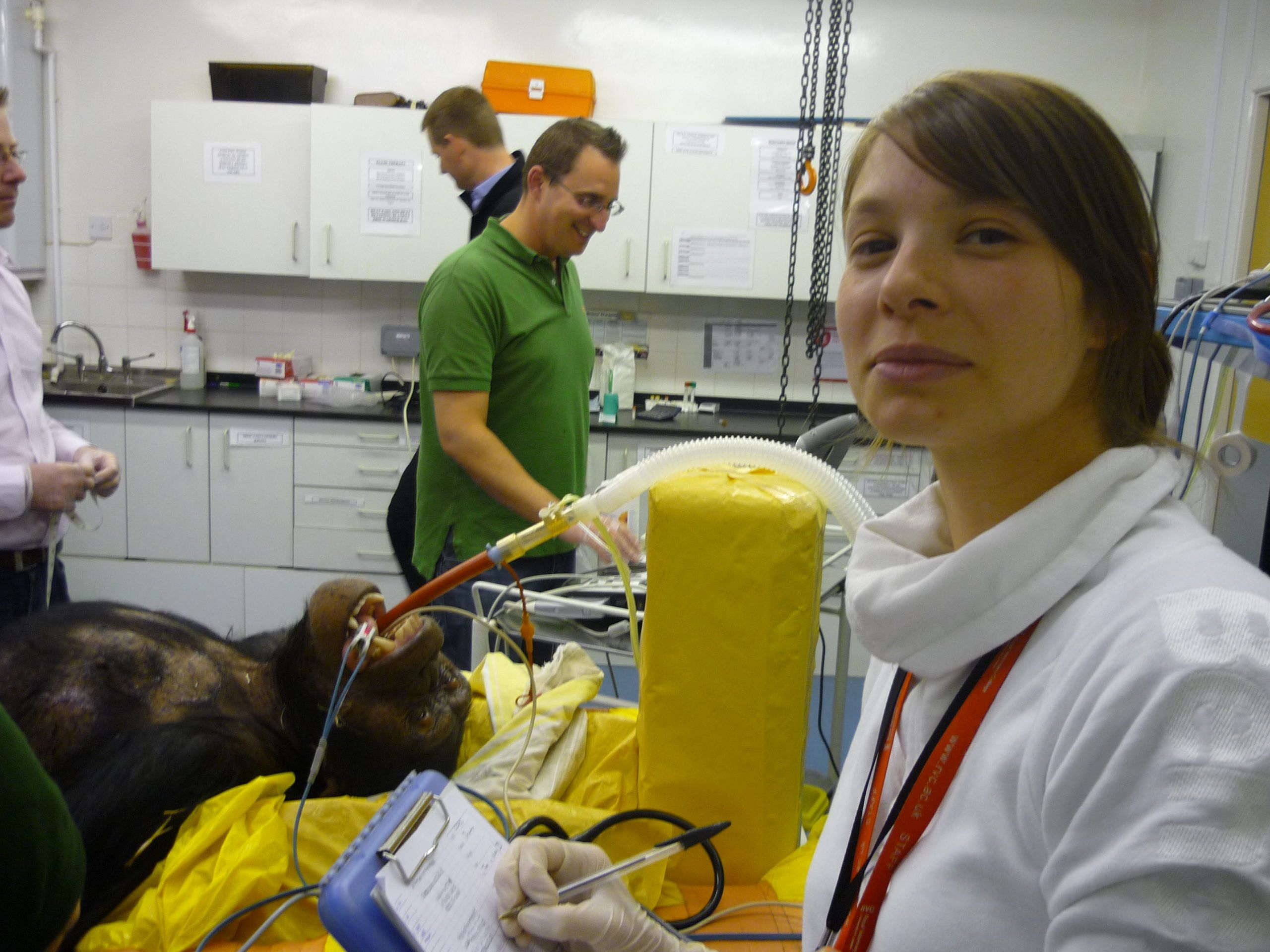Tell us a little about your career path after you finished your Veterinary degree at CEU UCH:
What year did you finish?
I finished Veterinary Medicine in 2007. It was a six-year degree. I was supposed to finish in 2006, but I had a few difficulties and it took a year longer.
I can´t imagine that finishing one year later did too much harm, though…
No, no. As a matter of fact it suits better. Although you have to stay for another year, you end up with better grades and you improve your records to have better access to other things later. I haven´t really needed a CV or academic record in that sense, but it always helps when you´re applying for scholarships or programmes like that.

How was the Royal Veterinary College in London? Did the opportunity come out of the blue? Or did you discover it yourself?
Well, I finished my degree and then in April 2008 I went to do an internship at the Universidad Autónoma in Barcelona. Basically, it was like a year of work experience where you get a low salary. But you get access to a training programme, where you rotate around all the services and jobs with their respective specialists. This way, you get an idea of what you´d like to do afterwards. In my case, I knew what area I wanted to get into: anaesthesia. It´s quite difficult to specialise in Europe, so that opened a few doors for me. From there I could do another internship at the Royal Veterinary College, which was more orientated around anaesthesia. The following year I started my residency. It was a rollercoaster, if I´m honest. Other people come here and they often struggle, but I was quite lucky; I didn´t want to leave!
How did you know you could do the internship at the Royal Veterinary College?
It was really through the professors at the university in Barcelona. When I told them I was interested in anaesthesia, they helped me find contacts.
Did you already have plans to leave Spain, or was this out of the blue?
I did and I didn´t have plans to leave. I knew that if I wanted to do anaesthesia, I couldn´t do it in Spain. I had to go somewhere, but it didn´t matter where.
Having lived in Barcelona for a year and loving it, and seeing that I really loved what I wanted to do…well, the truth is I didn´t even think about it. I think about it more now, when I miss home, when I want to leave, if I´m honest. It was quite clear to me: if there was nothing in Spain that I liked any better, of course this had to be it.
Before you left, were you scared or anxious about leaving your country and beginning a new life experience?
Yes. I thought: “everything is going to be so different”. There was a language barrier as well. When I came here, my English wasn´t very good and, well, it cost me, because you never know what´s going to happen! Luckily, and I don´t know if it would happen in every country, when they realised I was from Spain and had just arrived, they really helped me and showed me around. In fact, if you need somewhere to stay they´re really helpful too, because everyone´s in the same boat – some even arriving with just the clothes on their backs!
And now, when I see people who have just arrived and they don´t know where to go, I give them a hand. Of course I remember the first day I arrived… I had no idea how to do anything. You have to go to the bank and open an account, buy a mobile, get yourself a social security number…all these things that you´d hardly know how to do in Spain, because you´d never need to. It´s definitely a big change. I was scared, but lots of people help you and then it isn´t so bad.
How did you adapt when you got there? How did the English people receive you? Did they give you a hand and help you get settled in?
I think it really depends on the environment you´re moving to. In my work, they were really used to having people from different countries and cultures.
It has to be said, the English are a little bit conservative, but I suppose you get that everywhere. There are wonderful people, and then people who pass you by. But that happens everywhere too. Mainly though, they help out and show you around.
Generally, I was quite happy. In my opinion, it´s the people who identify with you or the ones who are in the same boat as you that will help. But anyway, in general I found they had a positive attitude.

When you went to London, how long had it been since you finished your studies?
About a year and a half. It was 2009.
So you weren´t exactly a recent graduate…
No.
Do you think it´s hard to get used to living in a cosmopolitan city where you don´t know anyone? Would you say that your adaptation was more gradual, or faster than what you thought it would be?
It was quite gradual, because things are different there. The truth is that you always miss your house, the sun, the weather…and all that makes you a little bit depressed, because it´s constantly raining, it´s cold…you´re not used to it.
I live in the outskirts, not the city centre, although it´s still like any other big city in Spain; Barcelona, Madrid or Valencia even. I don´t think you really notice the difference. I´d tell myself not to chicken out. And then it´s quite interesting too, because there are people from different cultures and classes. If you´re worried about getting to know people and making friends, I´m telling you: it´s FULL of Spanish people. Full! You´ll turn the corner and bump into four or five of them…and if not, there are people from lots of other countries trying to make friends too.
Now that we´re on the subject, Sandra, I´d like to ask if, when you arrived in London (which has been so important on both a national and international level) you really noticed a rise in the number of Spaniards there? Is it really very noticeable?
I think so, even just that people are coming from lots of other countries in general. Every time you´re on Facebook or another social network, you´re saying “Oh, he/she is here now too”, or you see them on the plane: “Are you living here now?” – “Yeah, I decided to come out too!”
Professional training in England
Do you think the training you received in Spain (at UCH-CEU and the Universidad Autónoma in Barcelona) was better than the Royal Veterinary College?
I think it´s high because I´m a hard worker anyway. But I did notice a change in level. The truth is that I noticed a difference between Valencia and Barcelona, and then the jump from Spain to England was massive.
Normally I´m in contact with the students and I´m teaching them, and a student in their fifth year will know things that…well, they´ll say things like “Yes, I came across that recently”. It´s very clear that they´re coming to the College very well prepared, and they leave as real professionals. I would have to emphasize that. They live and breathe what they know, and they´re always thinking about what can offer them most professionally.
But yes, without a doubt, I noticed a difference.

From your own experience, why do you think this gap might exist between the professional training in England, compared to that in Spain or other countries?
I think it´s a question of mentality. In general, English people are serious about what they do on a day-to-day basis. They take their jobs very seriously. They´re people who, if they work eight hours a day, they work hard all day, and they´re really focussed. And I think young people are like that too. They´re very hard-working and they take what they do seriously. They´re really motivated.
Future perspectives
You said that you´ll be finishing your residency in June. What do you think you´ll do afterwards?
I think I´ll do my doctorate, which would be another three years in this university. I really like doing investigation work, and now I´m getting into it more, solving problems and questioning things…it´s orientated around my interests: working in the university and being dedicated to teaching. That´s what I like doing.
Will you ever return to Spain, do you think?
One day, yes.
I know that right now I can´t really go back, and I have to make the most of my time here, the opportunity I´ve been given, and my training.
And, on the other hand, if there isn´t any work for me at the moment in Spain, I´m not going to go back to do what I could have done right after graduation!
Impact
What have you gained from this experience?
I´ve grown as a person, for example. I came without knowing anyone; I had to get by on my own. Of course, I had support later…but all this helps you to grow. It changes your character, makes you more independent, gives you a ton of new life experiences that you wouldn´t have had otherwise. I think that´s the most valuable thing of all, being able to experience things that wouldn´t have happened if you hadn´t moved in the first place!
Do you think you’re the same person you were four years ago, packing your bags to make a new life in London?
Not at all! I still struggle to make decisions…but no, I don´t think I´m the same person.
In what way have you changed most?
Well, I´m more independent, decisive…”bossy”, as they say here. Before I was anxious about asking favours from people, whereas now I´m not. Being able to ask for help and say “can you do this, or do that” helps you to get over these inhibitions.
Could you ever have imagined (at university, for example) being where you are now?
No. I imagined having a normal life, taking some more exams…but on the other hand, that life is difficult and expensive (I know because I have friends who took that route!)
But I think that staying in Valencia, having a job, working from 8am until 3pm…well, once you get into all that, you realise that your studying isn´t enough; you´re expected to have work experience, extra-curricular activities etc.
Global Impression
In your opinion, as someone who´s been training in the UK recently, do you think it´s a country which can offer possibilities to people who are looking to travel with work?
I think so; it´s quite common. Everyone finds something that they love doing. And I´m not just talking about Veterinary studies here. I have friends who work in other fields, like Economy, Business…everyone is on the same boat. Veterinary studies are quite prestigious, too. They like their recognition here. It´s nice when people appreciate your job, your opinion and what you do.
Do you think the English value their training of Spanish people?
Yes, they appreciate that we´re hard-working, just like them. A little stubborn, maybe, but hard-working!

Support
What advice would you give to anyone who is looking for work abroad?
If they are really tired, nothing interests them and they don´t feel that they´re going to find what they´re looking for… yes, I´d encourage them to go elsewhere. Where, exactly, depends on the individual, but they should go abroad in general. The experience is fantastic, and if worse comes to worst, you can always go back.
I know people who have come to learn English as opposed to work, and have managed to go back to Spain and get a job simply due to them having better English.
Would you like to say anything that perhaps you would have liked to know before you left?
Don´t be afraid to go for it, because like I said, you can always come home. Fight for what you want, and don´t give up. I believe that if you work hard, you can achieve anything. From my own experience, I can say that I didn´t really have a sufficient level of English when I came here, I didn´t have a CV, but if you can prove that you´re really worth something, you´ll go far.
What would you say to someone looking to work in London; find something before you go, or see how things pan out when you get there?
Yes, I think if you can take a risk (with a Plan B, of course), it´s worth it because it´s so exciting. However, at the same time, don´t just turn up with nothing but the clothes on your back.
For example, one day we were in a café in London and the waitress was Spanish. She´d studied architecture and was looking for a job on her own, and meanwhile trying to improve her English. In our group, there was a girl who knew people who worked in an architecture studio, and she gave the waitress contact details to help out.
What I mean is that opportunities will always come up and there are always people who will help you, because everyone helps each other out here. I know that for a fact.
You always have the option of doing something that improves your English, which will give you some time to hand out your CV to businesses and seeing what appeals to you most.
Is there anything else you´d like to add that we haven´t covered yet?
I´d just like to highlight that whoever goes abroad will always find help; the important thing is just to go and find what you love doing. It´s expensive…yes. I finish my day tired, I don´t sleep all that well and I hardly have any spare time on my hands…but I enjoy what I do. I couldn´t see myself doing anything else.
I´d also encourage university students to go abroad, to see how other institutions work and what teaching methods they use. If you see a big difference, ask yourself: “why shouldn´t I have the same things?”






